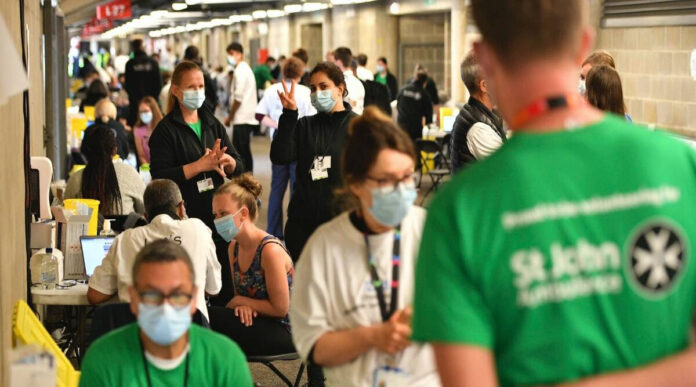WASHINGTON — Just three weeks ago, Great Britain celebrated the success of its vaccination campaign by lifting many coronavirus-related restrictions. “Goodbye, lockdown,” one headline said. But since then, a more transmissible new strain of the coronavirus has taken hold, imperiling plans to fully reopen the country on June 21.
Public health officials in the United States are now grappling with the possibility that a similar regression could take place here and, just as in the U.K., place in jeopardy the end of the pandemic that many had foreseen for this summer.
The potent new variant, known as Delta or B.1.617, emerged in India during that country’s recent coronavirus surge. According to British Health Secretary Matt Hancock, it is around 40 percent more transmissible than the original strain, or wild type, that first appeared in 2019. While several coronavirus variants have appeared since the start of the pandemic, epidemiologists worry that mutation could create a strain that evades vaccines.
Dr. Eric Topol, founder of the Scripps Research Translational Institute, called the Delta variant “the worst we’ve seen so far.”
The Delta variant accounts for only about 6 percent of cases in the United States, according to genomic sequencing studies. But that could change rapidly, Dr. Anthony Fauci, the top public health adviser to President Biden, warned during a Tuesday briefing of the White House pandemic response team.
- Eritrea viewpoint: I fought for independence but I’m still waiting for freedom
- US super-rich pay almost no income tax
“We cannot let that happen in the United States,” Fauci said, describing the scenario in the U.K. as a “powerful argument” for vaccination. Biden has set the goal of inoculating 70 percent of American adults by the July 4 weekend. Although the nation has now surpassed 300 million doses of coronavirus vaccine administered, the effort has recently slowed.
The emergence of the Delta variant presents a new challenge because, as University of Edinburgh immunologist Eleanor Riley told the Financial Times, vaccines provide “somewhat less protection against infection with the Delta variant.” Even fully vaccinated people appear to develop fewer neutralizing antibodies against the Delta strain than for other variants.
Fauci also said in Tuesday’s briefing that the new variant may be “associated with increased disease severity” compared with the coronavirus wild type.
People who have had only their first dose of the two-dose vaccines from Pfizer and AstraZeneca appear to be especially vulnerable to the Delta variant, Fauci said on Tuesday. (The AstraZeneca vaccine has been widely used in Europe but is not being administered in the United States; the Moderna vaccine, by contrast, is popular in the United States but not in the United Kingdom.) While both vaccines were about 50 percent effective against the original SARS-CoV-2 strain three weeks after the first dose, they were only 33 percent effective against the Delta strain.
Two weeks after the second dose, their effectiveness jumped to 88 percent for Pfizer and 60 percent for AstraZeneca, representing what were only slight decreases in effectiveness when compared with the original coronavirus strain.
Seventy-seven percent of the British population over the age of 18, or 40 million people, have had a single shot, according to government data; 28 million have had a second shot, accounting for 54 percent of the population.
The United States is in a similar position, having vaccinated 53 percent of its adult population fully, according to the Centers for Disease Control and Prevention; 64 percent are partially vaccinated.
During Tuesday’s briefing, Fauci noted that peak transmission of the virus was in the 12-to-20 age group in the U.K. Adolescents became eligible for the vaccine last month in the United States. In the U.K., however, vaccination for younger people has been significantly slower.
England, where 56.3 million of the U.K.’s 66.8 million residents live, only this week began vaccinating 25- to 29-year-olds.
Asked about what the Biden administration was doing to blunt the effects of the Delta strain, a White House official referred to a flurry of incentives and outreach efforts announced by the president last week.
SOURCE: YAHOO NEWS





